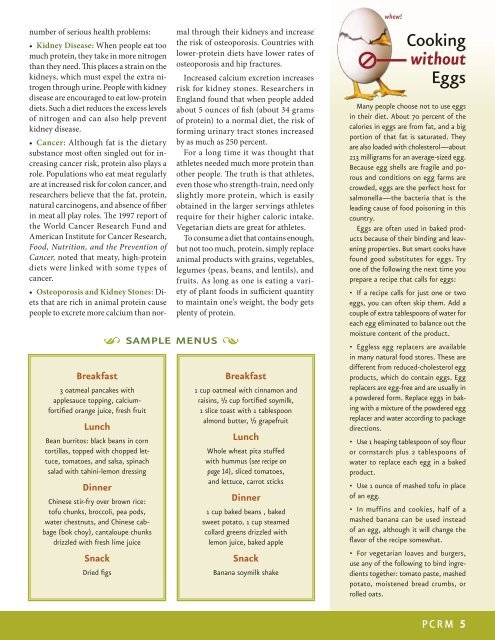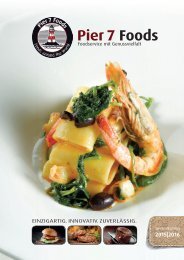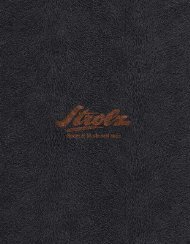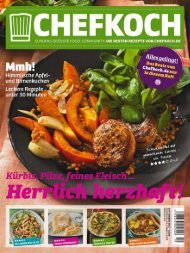testff
testfff
testfff
You also want an ePaper? Increase the reach of your titles
YUMPU automatically turns print PDFs into web optimized ePapers that Google loves.
number of serious health problems:<br />
• Kidney Disease: When people eat too<br />
much protein, they take in more nitrogen<br />
than they need. This places a strain on the<br />
kidneys, which must expel the extra nitrogen<br />
through urine. People with kidney<br />
disease are encouraged to eat low-protein<br />
diets. Such a diet reduces the excess levels<br />
of nitrogen and can also help prevent<br />
kidney disease.<br />
• Cancer: Although fat is the dietary<br />
substance most often singled out for increasing<br />
cancer risk, protein also plays a<br />
role. Populations who eat meat regularly<br />
are at increased risk for colon cancer, and<br />
researchers believe that the fat, protein,<br />
natural carcinogens, and absence of fiber<br />
in meat all play roles. The 1997 report of<br />
the World Cancer Research Fund and<br />
American Institute for Cancer Research,<br />
Food, Nutrition, and the Prevention of<br />
Cancer, noted that meaty, high-protein<br />
diets were linked with some types of<br />
cancer.<br />
• Osteoporosis and Kidney Stones: Diets<br />
that are rich in animal protein cause<br />
people to excrete more calcium than nor-<br />
Breakfast<br />
3 oatmeal pancakes with<br />
applesauce topping, calciumfortified<br />
orange juice, fresh fruit<br />
Lunch<br />
Bean burritos: black beans in corn<br />
tortillas, topped with chopped lettuce,<br />
tomatoes, and salsa, spinach<br />
salad with tahini-lemon dressing<br />
Dinner<br />
Chinese stir-fry over brown rice:<br />
tofu chunks, broccoli, pea pods,<br />
water chestnuts, and Chinese cabbage<br />
(bok choy), cantaloupe chunks<br />
drizzled with fresh lime juice<br />
Snack<br />
Dried figs<br />
sample menus<br />
mal through their kidneys and increase<br />
the risk of osteoporosis. Countries with<br />
lower-protein diets have lower rates of<br />
osteoporosis and hip fractures.<br />
Increased calcium excretion increases<br />
risk for kidney stones. Researchers in<br />
England found that when people added<br />
about 5 ounces of fish (about 34 grams<br />
of protein) to a normal diet, the risk of<br />
forming urinary tract stones increased<br />
by as much as 250 percent.<br />
For a long time it was thought that<br />
athletes needed much more protein than<br />
other people. The truth is that athletes,<br />
even those who strength-train, need only<br />
slightly more protein, which is easily<br />
obtained in the larger servings athletes<br />
require for their higher caloric intake.<br />
Vegetarian diets are great for athletes.<br />
To consume a diet that contains enough,<br />
but not too much, protein, simply replace<br />
animal products with grains, vegetables,<br />
legumes (peas, beans, and lentils), and<br />
fruits. As long as one is eating a variety<br />
of plant foods in sufficient quantity<br />
to maintain one’s weight, the body gets<br />
plenty of protein.<br />
Breakfast<br />
1 cup oatmeal with cinnamon and<br />
1 slice toast with 1 tablespoon<br />
Lunch<br />
Whole wheat pita stuffed<br />
with hummus (see recipe on<br />
page 14), sliced tomatoes,<br />
and lettuce, carrot sticks<br />
Dinner<br />
1 cup baked beans , baked<br />
sweet potato, 1 cup steamed<br />
collard greens drizzled with<br />
lemon juice, baked apple<br />
Snack<br />
Banana soymilk shake<br />
whew!<br />
Cooking<br />
without<br />
Eggs<br />
Many people choose not to use eggs<br />
in their diet. About 70 percent of the<br />
calories in eggs are from fat, and a big<br />
portion of that fat is saturated. They<br />
are also loaded with cholesterol—about<br />
213 milligrams for an average-sized egg.<br />
Because egg shells are fragile and porous<br />
and conditions on egg farms are<br />
crowded, eggs are the perfect host for<br />
salmonella—the bacteria that is the<br />
leading cause of food poisoning in this<br />
country.<br />
Eggs are often used in baked products<br />
because of their binding and leavening<br />
properties. But smart cooks have<br />
found good substitutes for eggs. Try<br />
one of the following the next time you<br />
prepare a recipe that calls for eggs:<br />
• If a recipe calls for just one or two<br />
eggs, you can often skip them. Add a<br />
couple of extra tablespoons of water for<br />
each egg eliminated to balance out the<br />
moisture content of the product.<br />
• Eggless egg replacers are available<br />
in many natural food stores. These are<br />
different from reduced-cholesterol egg<br />
products, which do contain eggs. Egg<br />
replacers are egg-free and are usually in<br />
a powdered form. Replace eggs in baking<br />
with a mixture of the powdered egg<br />
replacer and water according to package<br />
directions.<br />
• Use 1 heaping tablespoon of soy flour<br />
or cornstarch plus 2 tablespoons of<br />
water to replace each egg in a baked<br />
product.<br />
• Use 1 ounce of mashed tofu in place<br />
of an egg.<br />
• In muffins and cookies, half of a<br />
mashed banana can be used instead<br />
of an egg, although it will change the<br />
flavor of the recipe somewhat.<br />
• For vegetarian loaves and burgers,<br />
use any of the following to bind ingredients<br />
together: tomato paste, mashed<br />
potato, moistened bread crumbs, or<br />
rolled oats.<br />
PCRM 5

















